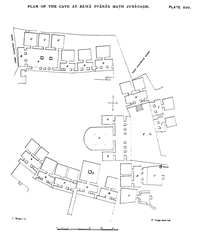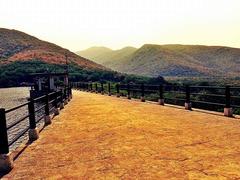Visiting Hours, Tickets, and Historical Insights of Jumma Masjid in Junagadh
Date: 18/07/2024
Introduction
Planning a visit to Junagadh, India? One of the must-visit destinations in this historically and culturally rich city is the Jumma Masjid. This mosque, a prime example of Indo-Islamic architecture, dates back to the 15th century and embodies the region’s unique blend of Islamic and Hindu elements. Initially constructed by Mahmud Begada, the Sultan of Gujarat, Jumma Masjid stands as a testament to the historical and architectural grandeur of the Sultanate period. Whether you’re a history enthusiast, an architecture aficionado, or simply a curious traveler, this comprehensive guide on Jumma Masjid will provide you with all the essential information, from its historical significance and architectural marvels to practical tips for visitors. (Gujarat Tourism)
Table of Contents
- Introduction
- History of Jumma Masjid, Junagadh
- Visitor Information
- Accessibility and Amenities
- Nearby Attractions
- FAQ
- Conclusion
History of Jumma Masjid, Junagadh
Origins and Early History
The Jumma Masjid in Junagadh, Gujarat, India, is a significant historical and architectural landmark. Its origins date back to the 15th century during the reign of Mahmud Begada, the Sultan of Gujarat. The mosque was constructed on the site of an old Hindu temple, which was a common practice during that era to signify the dominance of the new rulers. The mosque’s foundation is believed to have been laid around 1456 CE, and it was completed in 1472 CE.
Architectural Evolution
The architectural style of Jumma Masjid reflects a blend of Islamic and Hindu elements, a testament to the cultural syncretism of the period. The mosque features a large courtyard, a prayer hall with intricately carved pillars, and a series of domes and minarets. The use of local sandstone and marble adds to the aesthetic appeal of the structure. The prayer hall is particularly notable for its 140 pillars, which are believed to have been repurposed from the original Hindu temple. This architectural amalgamation is a significant example of the Indo-Islamic style that flourished in Gujarat during the Sultanate period.
Historical Significance
Jumma Masjid has played a crucial role in the religious and social life of Junagadh. It served as the primary place of worship for the Muslim community and was also a center for learning and cultural activities. The mosque’s construction marked the consolidation of Muslim rule in the region, and it became a symbol of the Sultanate’s architectural and cultural achievements. Over the centuries, the mosque has witnessed numerous historical events, including the Mughal conquest of Gujarat and the subsequent integration of the region into the Mughal Empire.
Restoration and Preservation
In the 19th and 20th centuries, the mosque underwent several restoration efforts to preserve its architectural integrity. The Archaeological Survey of India (ASI) has been instrumental in these preservation efforts, ensuring that the mosque remains a significant historical and cultural landmark. The ASI has undertaken various conservation projects to restore the mosque’s structural stability and aesthetic features, including the intricate carvings and inscriptions that adorn the pillars and walls.
Cultural and Religious Impact
Jumma Masjid continues to be an important religious site for the Muslim community in Junagadh. It hosts regular prayers, especially the Friday congregational prayers, which attract a large number of worshippers. The mosque also plays a vital role during Islamic festivals such as Eid al-Fitr and Eid al-Adha, serving as a focal point for communal gatherings and celebrations. The mosque’s historical and cultural significance extends beyond the local community, attracting tourists and scholars interested in the region’s rich heritage.
Modern-Day Relevance
Today, Jumma Masjid stands as a testament to the rich historical and cultural tapestry of Junagadh. It is a popular tourist destination, drawing visitors from across India and around the world. The mosque’s unique architectural features and historical significance make it a must-visit site for anyone interested in the history and culture of Gujarat. The local government and various heritage organizations continue to promote the mosque as a key cultural landmark, ensuring its preservation for future generations.
Visitor Information
- Ticket Prices: Admission to Jumma Masjid is free. However, donations for maintenance are appreciated.
- Opening Hours: The mosque is open from 9:00 AM to 6:00 PM, with a break during afternoon prayer times. Visitors are required to dress modestly and remove their shoes before entering the prayer hall. Photography is allowed in the courtyard but may be restricted inside the prayer hall. It is advisable to check with local authorities or the mosque’s management for any specific guidelines or restrictions before planning a visit.
Accessibility and Amenities
Jumma Masjid is located in the heart of Junagadh, making it easily accessible by various modes of transportation. The nearest railway station is Junagadh Junction, which is well-connected to major cities in Gujarat and other parts of India. Local buses and auto-rickshaws are readily available for transportation within the city. The mosque is also equipped with basic amenities such as restrooms and drinking water facilities for visitors. For those interested in learning more about the mosque’s history and architecture, guided tours are available upon request.
Nearby Attractions
In addition to Jumma Masjid, Junagadh boasts several other historical and cultural attractions. The Uparkot Fort, located nearby, offers stunning views of the city and houses several ancient structures, including Buddhist caves and step wells. The Mahabat Maqbara, another architectural marvel, is known for its intricate carvings and unique design. Visitors can also explore the Girnar Hills, which are home to several ancient temples and offer excellent trekking opportunities. These attractions, along with Jumma Masjid, make Junagadh a fascinating destination for history and culture enthusiasts.
FAQ
- What are the visiting hours of Jumma Masjid? Jumma Masjid is open from 9:00 AM to 6:00 PM, with a break during afternoon prayer times.
- Are there any entry fees for Jumma Masjid? Admission to Jumma Masjid is free, but donations for maintenance are appreciated.
- What is the best time to visit Jumma Masjid? The best time to visit is during the cooler months from October to March. Avoid visiting during prayer times to explore the mosque uninterrupted.
Conclusion
Jumma Masjid in Junagadh is not just a place of worship but a historical and cultural gem. From its intricate architectural details to its role as a community center, the mosque offers a rich experience for visitors. Plan your visit to this remarkable site and immerse yourself in its unique blend of history, culture, and spirituality. For more information on Jumma Masjid and its significance, you can visit Gujarat Tourism.

